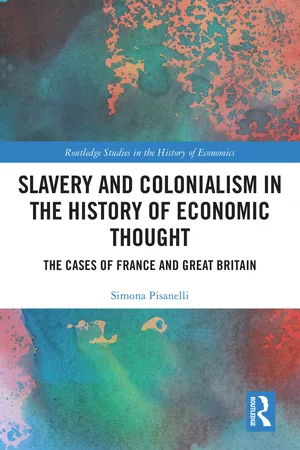
Slavery and Colonialism in the History of Economic Thought
The Cases of France and Great Britain
- 170 pages
- English
- ePUB (mobile friendly)
- Available on iOS & Android
Slavery and Colonialism in the History of Economic Thought
The Cases of France and Great Britain
About This Book
Atlantic slavery represents one of the blackest pages of human history. European powers not only colonised American lands but also brought African men and women to work as slaves on plantations. Intellectuals did not remain indifferent to this practice and – from the second half of the 18th century – criticised the institution of slavery from an ethical, legal, and economic point of view.
This book aims to briefly illustrate the colonisation process implemented by France and Great Britain in the Caribbean and to reconstruct the debate on colonialism and slavery that developed in these two countries, approaching the issue from the standpoint of the History of Economic Thought. The decisive phase in this debate took place in the second half of the 18th century, when some classical economists belonging to the cultural movement of the Enlightenment laid the foundations for the critique of a production system based on slavery. On the same basis, some economists of the first half of the 19th century continued to express their critical attitude towards slavery and colonialism. The ideas of the Enlightenment, although of European origin, are also useful in analysing the different levels of development that the former American colonies achieved following independence, choosing to invest in either industry or agriculture.
This book provides the reader with the critical tools to understand that opting for slavery was not only an unforgivable sin in human history but also an economically irrational choice.
Frequently asked questions
Information
Table of contents
- Cover
- Half Title
- Series Page
- Title Page
- Copyright Page
- Dedication
- Table of Contents
- Acknowledgements
- The origins of the abolitionist debate. A historical introduction
- 1 Slavery and economic backwardness: The French Enlightenment paradigm
- 2 Slavery and economic backwardness in the Scottish Enlightenment
- 3 Slavery and French colonies in the 19th century: New debate, old questions
- 4 Slavery and the colonies in the 19th century: Britain looks to the United States
- 5 Conclusions. Recurring themes in the abolitionist debate
- Index